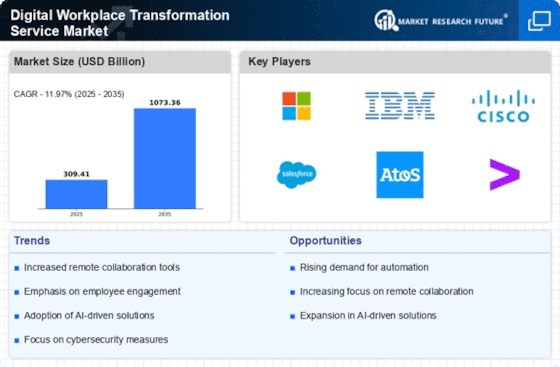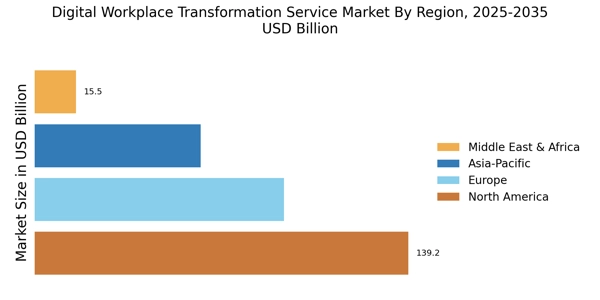Emphasis on Employee Experience
In the Digital Workplace Transformation Service Market, there is a growing emphasis on enhancing employee experience. Organizations recognize that a positive work environment directly correlates with employee satisfaction and retention. As a result, companies are investing in tools and services that promote collaboration, communication, and flexibility. The market data indicates that organizations focusing on employee-centric solutions are likely to experience higher productivity levels and lower turnover rates. This trend underscores the importance of creating a supportive digital workplace that caters to the diverse needs of employees, ultimately driving transformation initiatives.
Demand for Remote Work Solutions
The Digital Workplace Transformation Service Market is experiencing a surge in demand for remote work solutions. As organizations adapt to flexible work arrangements, there is a pressing need for services that facilitate seamless collaboration and communication among distributed teams. Market data indicates that the adoption of remote work technologies is expected to continue growing, driven by the need for businesses to maintain productivity in a decentralized environment. This trend highlights the importance of investing in digital tools that support remote work, ensuring that organizations can effectively navigate the challenges associated with a dispersed workforce.
Increased Focus on Cybersecurity
The Digital Workplace Transformation Service Market is increasingly characterized by a heightened focus on cybersecurity. As organizations transition to digital platforms, the risk of cyber threats escalates, prompting businesses to prioritize security measures. This trend is reflected in the growing investment in cybersecurity solutions, which are essential for protecting sensitive data and maintaining operational integrity. Market analysis suggests that companies are more inclined to adopt comprehensive cybersecurity frameworks as part of their digital transformation strategies. This proactive approach not only safeguards assets but also fosters trust among stakeholders, thereby enhancing the overall effectiveness of transformation efforts.
Integration of Advanced Technologies
The Digital Workplace Transformation Service Market is witnessing a notable shift towards the integration of advanced technologies such as artificial intelligence, machine learning, and automation. These technologies enhance operational efficiency and streamline workflows, thereby improving productivity. Organizations are increasingly adopting these solutions to facilitate data-driven decision-making and optimize resource allocation. According to recent estimates, the market for AI in workplace transformation is projected to grow significantly, indicating a robust demand for services that incorporate these technologies. This trend suggests that businesses are prioritizing technological investments to remain competitive in an evolving landscape.
Regulatory Compliance and Governance
In the Digital Workplace Transformation Service Market, regulatory compliance and governance are becoming increasingly critical. Organizations are required to adhere to various regulations concerning data protection, privacy, and operational standards. This necessity drives the demand for transformation services that ensure compliance with legal frameworks. Industry expert's suggest that companies are investing in solutions that not only facilitate compliance but also enhance governance practices. This trend indicates a growing recognition of the importance of aligning digital transformation initiatives with regulatory requirements, thereby mitigating risks and fostering sustainable growth.

















